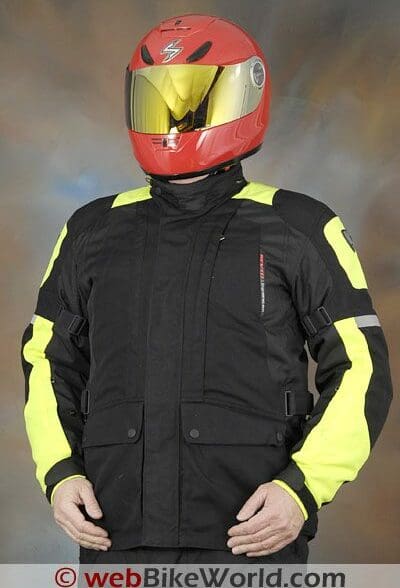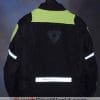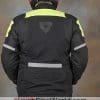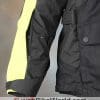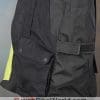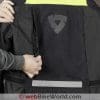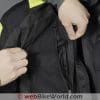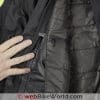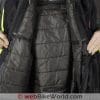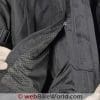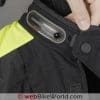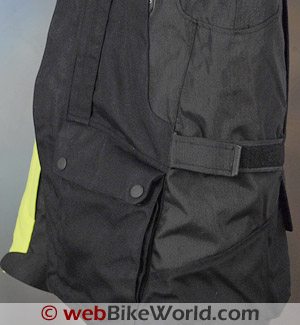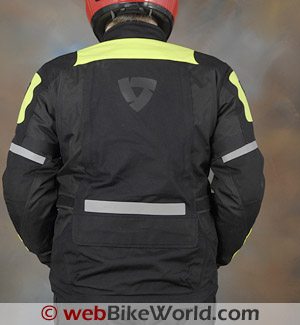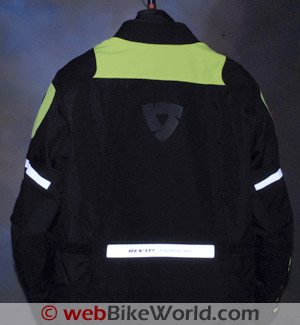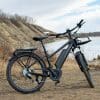Who’s wearing 3/4-length jackets? Anyone?? We’ve had several very nice examples, all in pristine condition, up for grabs in the webBikeWorld garage sale, but no takers. I can’t remember the last time we received an email about a 3/4-length jacket. And I no longer see many 3/4-length jackets on the street. All of which leads me to believe that this jacket type is going the way of the two-stroke.
Maybe I’m wrong — tell me, please! But if this is true, it’s really too bad, because you simply can’t find a more versatile motorcycle jacket than the good ol’ 3/4-length. Thank goodness the manufacturers who pump out these jackets haven’t gotten the message; they’re still evolving the breed, bringing us amazing new features year after year.
The three jackets in this series are a perfect example; the Rev’it! Dragon, the Tourmaster Transition Series 2 and the Tourmaster Epic jackets are hot-off-the-press (make that the sewing machine) examples of the continuing evolution of this versatile motorcycle jacket style.
webBikeWorld visitors frequently ask for advice on the “best” helmet, gloves, jacket or pants. If only it was that easy! Simply put, there is no such thing as the “best” of anything. There are just too many individual and personal criteria for each and every rider, and what’s “best” for one may not be — and probably won’t be — for another, especially in today’s niche-focused marketplace.
Sure, it would be much easier for us to simply tell you which one is “best”, but that would be a cop-out for us and for you. webBikeWorld is all about bringing you detailed information you can’t find anywhere else — including the manufacturers’ websites. We publish it; you study it; you develop your own criteria and figure out what’s going to work for you and what won’t.
Nobody said it was going to be easy, and if you’re going to fork over your hard-earned dosh for a website purchase of a jacket or helmet you haven’t even seen, much less touched, you’re going to have to do some homework to at least even the odds that you’ll make the right choice.
For those who don’t want to take that time and want to rely on somebody else to tell them what’s “best”, just grab any print magazine and read one of the press releases that pass for their product reviews. But don’t be surprised when you discover that the reality may be, oh, about 180 degrees from the vision.
This has all come to mind because each of the three jackets described in this series has a set of particular strengths and features that make them paradoxically similar but different.
Bill and I have been swapping them back and forth for the last few weeks and truth be told, these are all excellent examples of the 3/4-length jacket, and depending upon the needs of the individual, any one of them could serve as a “best” jacket. So let’s get going!
Part 1: The REV’IT! Dragon Jacket
The Dragon jacket is new for 2009, and it represents a slightly different tack by Rev’it, because the Dragon comes in at a more competitive price point than some of the other Rev’it 3/4-length jackets. This is good news, because the jackets at the upper end of the Rev’it product line can get a bit pricey.
The Dragon uses high-quality DuPont Cordura 500 and 1000 denier fabric, similar to the Cayenne Pro, so Rev’it isn’t scrimping here. The fabric sections that make up the jacket are laser cut, just like the upper-crust Rev’it jackets.
Laser cutting allows the designer to create more interesting shapes and patterns, but it also has a functional aspect, because the jacket can theoretically be made more comfortable with intricately cut sections forming a closer fit to the human shape.
The Dragon jacket is available in four colors; the high-visibility yellow shown here uses DuPont colorfast true high-visibility yellow fabric, and the Dragon is also available in an equally nice-looking bright red, blue and what Rev’it calls “grey” but looks white to me. The colors on the other jackets would be in the same places where the yellow is used on the jacket in these photos.
I was introduced to the Dragon jacket at the 2009 Powersports Dealer Expo this past February, and I do think that the jacket looks great in any of the four colors. The red and blue hues are especially vibrant, so I’m not sure if Rev’it is using a higher quality fabric or different dye process, but the styling of the Dragon jacket with the color patterns are very nice.
Jacket Weights and Sizing
As I was carrying the jackets down to the hanging scale for a weigh-in, I thought it would be easy — the Tourmaster Transition Series 2 felt the lightest, with the Rev’it Dragon in the middle and the Tourmaster Epic as the heavyweight.
This made logical sense, because the Tourmaster Transition Series 2 indeed feels a bit thinner on the road, which isn’t a criticism, just a fact. In fact, the lighter weight of that jacket can be an advantage for anyone living in a climate where a heavy-duty winter jacket isn’t desirable.
So it was a surprise to find that the Tourmaster Transition Series 2 jacket isn’t the lightest here; the Rev’it Dragon in size XL weighs in at 2.1 kg (4.75 lbs.), while the Tourmaster Transition Series 2 in size L weighs 2.5 kg (5.5 lbs.) and the Tourmaster Epic jacket, which is that manufacturer’s all-singing-and-dancing, top-of-the-line 3/4-length jacket, weighs in at a hefty 3.2 kg (7.0 lbs.) in size large.
But weight isn’t really a factor here, so there’s no extra points for being too heavy or too light. Because, as we’ll see, the weight of each jacket is a function of its capabilities; each jacket is very nicely focused in a particular niche that may precisely meet the prospective owner’s criteria.
With regards to fit, both Tourmaster jackets fit as expected in size large, generally shaped for a male of about 5’9″ to 5’11” (~178 cm) and 185 to 200 lbs. (~86 kg).
The Rev’it Dragon in size large definitely felt one size small, so it was returned in exchange for an XL. The XL Dragon fits like a standard size large 3/4-length jacket, so although Rev’it claims that the Dragon does not run small, indications from other Dragon owners I’ve talked to and our experience indicate differently.
The Dragon is available in a size range of XS to 4XL, but apparently not in Tall lengths.
Dragon Details
I’ll start the descriptions of all three jackets outside top, then work down to the bottom, then do the same for the inside. This standardization will hopefully allow some comparison between the trio.
Neck and Collar
The Dragon has many features that are either identical, similar or derived from other Rev’it jackets we’ve reviewed. However, there are a few differences that can be noted, based on the Dragon’s nearly 50% price difference from the high-end Rev’it Cayenne Pro jacket.
For example, the Dragon’s collar is not lined with soft fleece, but it does have a small tubular-shaped piping around the top that expands in front of the neck to form the front of the collar assembly. It’s lined with some type of puffy material and the fabric is definitely softer than the Cordura of the jacket shell. The material and the shape of the collar is noticeably comfortable across the front of the neck.
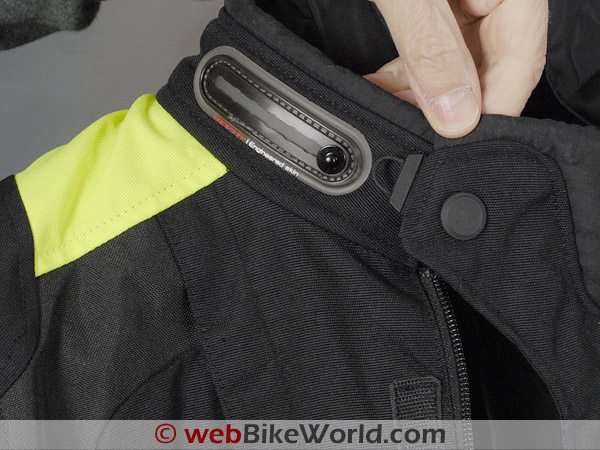
The collar does not use Velcro or hook-and-loop fastener; instead, it has the new Rev’it 7-position collar snap. This adjustable snap can be found on many of the new Rev’it jackets, and it’s an evolution of the original 5-position adjuster, which is good news because it offers a wider selection of neck adjustments.
The very tip of the right-hand side of the collar as it comes across the neck features a small nylon loop at the end that allows the collar to be folded back and hooked to an attached nylon hook on the left-hand side.
Zippers, Closures and Adjusters
Zippers
The full-length front zipper on the jacket shell has a placket that folds over the zipper for protection and seals with hook-and-loop from left to right. The zipper pull is typical Rev’it, made from a bended and formed wire frame. A small plastic zipper pull is attached around the end.
The removable wind- and water-proof liner also has a full-length front zipper and its own placket that protects the zipper and adds an extra layer of wind protection to the chest. This also seals with hook-and-loop to the right-hand side of the liner. The liner features a collar tab that attaches with hook-and-loop.
Sleeve Cuffs
The cuffs seal with a simple hook-and-loop attachment system. They expand via a dart cut into the fabric, backed with lining. This arrangement is both easier to use and slimmer than the more complicated system on the Cayenne Pro, with its zipper and plastic tab for the hook-and-loop.
The cuff can be tightly closed and it leaves minimal thickness, which fits into just about any size glove gauntlet. The Dragon cuff system is pretty basic, no doubt, but sometimes simpler is better!
Adjusters
The Dragon has a simple but effective sizing adjusters located at the waist, under the arms. The adjustment belt offers a very wide range of adjustment.
The adjuster band at the waist is covered with hook-and-loop fastener over its entire length, which seems like a necessary feature, but for some reason this is missed by so many other manufacturers. What good is an adjusting belt if there’s not enough hook-and-loop to adjust it properly?
The upper arms of the Dragon jacket include a long belt adjuster that runs about 5/8 of the way around the sleeve. These are both unobtrusive and effective. Each sleeve also features a snap adjuster on the lower part of the sleeve, about midway between the cuff and the elbow. These have two snaps, meaning one snap for tightening.
Liner and Lining
Probably the most unique feature of the Rev’it Dragon jacket is the removable liner. Rev’it says it’s waterproof and breathable, due to the use of Rev’it Hydratex, the same material used in the high-end Rev’it jackets and clothing.
The Hydratex is claimed to withstand a 5,000 mm column of water and can transmits up to 5,000 grams per square meter over 24 hours, which are figures taken from standardized tests for materials claimed waterproof and breathable.
Note that Rev’it is one of the few manufacturers who actually take the time and effort to get their fabrics tested, unlike many other manufacturers who slap on a “Waterproof! Breathable!” sticker and call it a day.
The liner attaches with zippers on either side up near the neck, which run about 190 mm long. The zippers are semi-hidden behind some fabric, so when the liner is removed, it can be easily worn as a casual windbreaker.
The liner includes slash hand pockets on either side and elastic in the hem, and it even has a discreet “REV’IT!” logo on the upper left chest, so you’re sort of getting a two-for-one with the Dragon jacket.
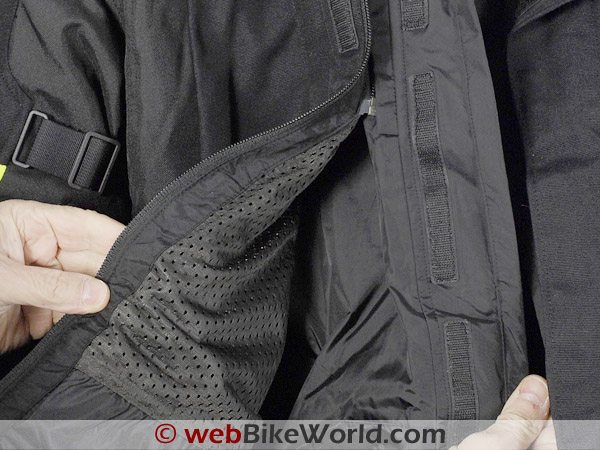
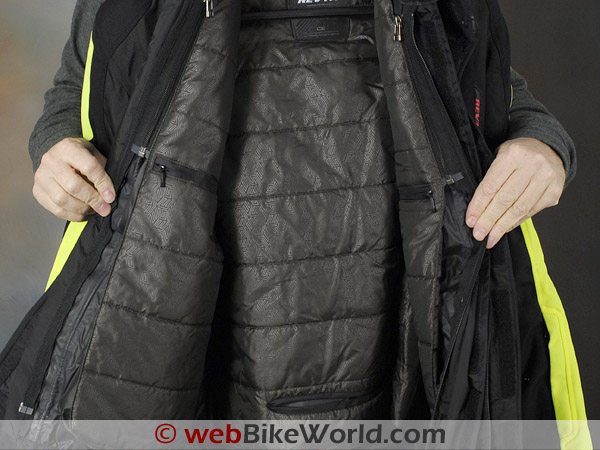
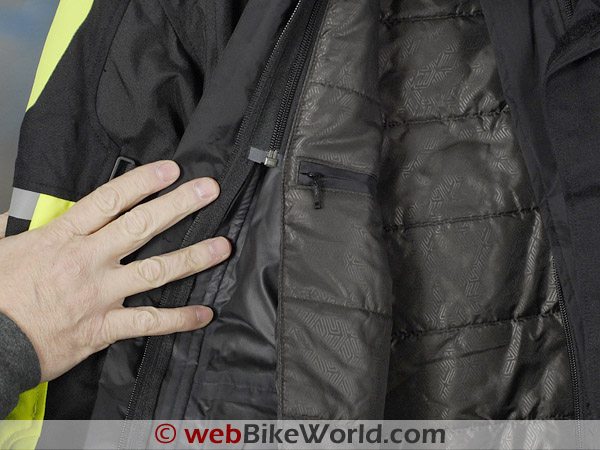
The liner’s sleeves attach to the inside of the jacket at the sleeve cuffs with a pair of loops and snaps. The loops are attached to the liner and the snaps are sewn into the jacket sleeves, so if the liner is being worn solo, the loops are somewhat less apparent than if the reverse were true.
With both the water/wind-proof liner and the insulating liner removed, the perforated lining attached to the inside of the shell can be seen. Comparing the jackets with all liners attached, the Dragon is thicker than the Tourmaster Transition Series 2 but not as thick as the Tourmaster Epic, which again is Tourmaster’s top-of-the-line jacket.
Remove the liners on the Dragon and you’ll end up with a relatively light weight outer shell that should work in warm weather up to about 29 degrees C (85 degrees F) or so.
Insulation
In addition to the Hydratex liner, The Dragon also has a separate full-length insulating liner that attaches to the removable windbreaker with the same type of 190 mm internal zippers located at the upper part of the chest, inside the placket.
The insulating liner material has a nice appearance and it feels soft. It’s also good-looking, with a silvery printed pattern inside that gives it a stylish ambience.
I do wish the sleeves could be removed from the liner, which would make the jacket even more versatile, but that probably would have added a few bucks more to the price, which was something Rev’it was trying to keep competitive, although you’d never know it compared to similar jackets.
The insulating liner also features an opening at the lower rear that allows the attached zipper on the Dragon jacket to connect to Rev’it pants without having the liner bunch up.
Also, the laser-cut fabric sections of the Dragon jacket provide a more bespoke fit, and this, along with the less-dense insulation, means that the jacket fits closer to true size with the liners removed than many other 3/4-length jackets.
This is where more isn’t always better — a big, thick, heavy 3/4-length jacket first of all doesn’t necessarily mean that it will be warmer, and it most likely will mean that as soon as the temperature starts to climb into decent riding territory that the liners will be jettisoned and the owner will find that the shell is one or even two sizes too large. So beware…
To summarize the liners, the Dragon is very versatile, with a removable wind- and water-proof Hydratex liner that can also be used as a casual walk-around jacket; a removable full-length insulating liner; and a double-walled front zipper barrier, with the windproof liner and jacket forming an effective seal against the elements.
Vents and Venting
The Dragon features two vertical vents in the chest and two vertical vents in the rear, along with vertical zippers on either arm, just above the cuff.
Each vent has a zipper opening; the zipper on the chest and rear vents is 230 mm long, while the arm vent zippers are about 150 mm long. The same type of perforated fabric used to line the jacket shell fills the vent opening when the zippers are opened.
By the way, these are vents only, not pockets. The lining is flush with the vent opening, so nothing can be stored inside.
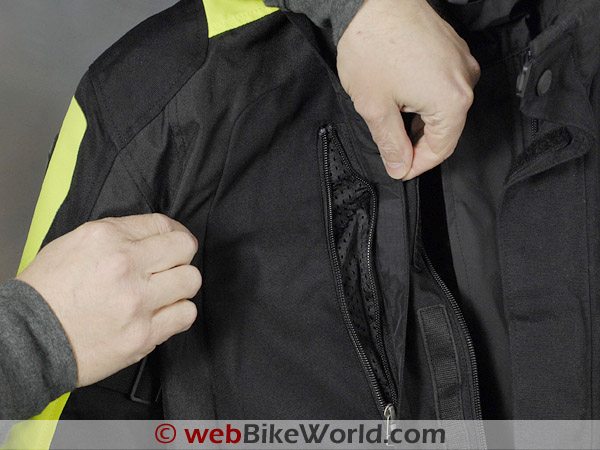
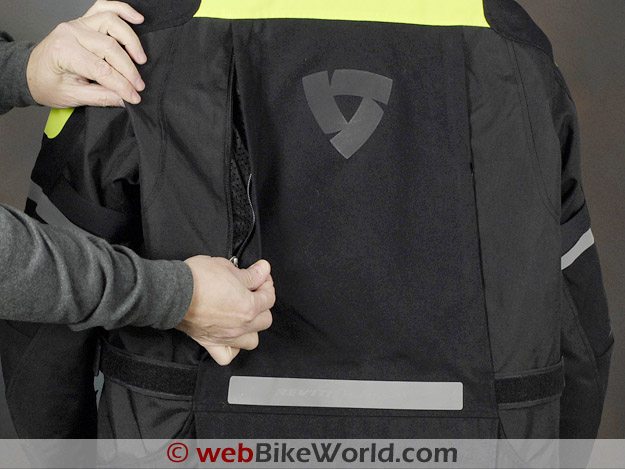
The chest vents are located on either side, about 1/4 of the way out from the placket to the arms. They are covered by a section of fabric, so with the zipper opened, the cover blocks the air. There’s no “forced air ventilation” unfortunately.
The rear vents are located out towards the sides of the jacket, and the zippers are located under the vertical seam that forms the edges of the jacket fabric in the rear. So both the front and rear vents are somewhat hidden by fabric, which may help in the styling department but probably affects the amount of air that can flow through.
The location of the arm vents may seem curious, but air actually does find its way in when riding, due to the position of the arms on the handlebars. Of course, the amount of air flow through the arm vents will vary, depending upon the type of motorcycle or windscreen.
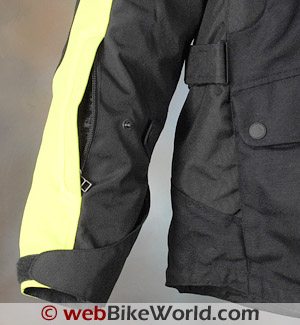
The Rev’it website says that the Dragon has “under arm” vents, but this is either an error or perhaps the text was written before the final version of the Dragon was released. So we’ll have to assume that by “under arm”, they mean the vents down by the cuff.
The weather remains cooler than normal so far this Spring; it should be in the mid-70’s by now, but it isn’t. We’ve been wearing the jackets in temperatures ranging from about 55 F to 65 F, not warm enough to remove the liners, so it’s difficult to say how the vents might work.
Both of us agree that we’d expect the vents on the Dragon to at least allow some warm air to escape, but it’s too bad the fabric covering the front vents couldn’t be folded back somehow to force-feed some air into the body of the jacket.
Otherwise, we think the Dragon is suited to a range of about 45 degrees to 85, give or take and depending upon the individual. This is what we’d consider average for a general-purpose 3/4-length jacket. The Dragon does a decent job of blocking the wind, but it does seem slightly less effective at doing so than, for example, the Rev’it Cayenne Pro or the Tourmaster Epic jacket we’ll cover in this series.
But those jackets have other disadvantages, mostly in weight and bulk, so it’s all a matter of compromise. For the indicated temperature range, which probably is the range of temperatures most commonly experienced by the vast majority of motorcyclists, the Dragon is perfectly suited.
Armor, Protection and Padding
The lower price point of the Dragon precludes the use of the high-tech materials found in other Rev’it jackets; materials with names like Dynax, Exkin, SAS-Tech and SuperFabric.
But the jacket includes quality Knox CE-approved armor protection at shoulders and elbows and an EVA foam pad in the back. All are removable, and the back pad could probably be replaced with a Knox or SAS-Tech version if desired, although some modification of the pocket may be required.
The Dragon does not have extra abrasion resistant wear points on the shoulders or elbows, relying instead on the heavy 1000D Cordura, which is also, by the way, relatively soft, unlike the Cordura of old, which sometimes felt as stiff as the canvas used on the Cutty Sark.
Reflectivity and Visibility
High-visibility clothing is in, and it’s about time! I’ve been as surprised as anyone to even see cruiser riders around here recently wearing high-visibility jackets. Amazing!
My theory for this is that the new motorcycle owners and returning riders, who were motivated back into the sport during the high fuel prices of 2008, are a new breed who aren’t as interested in playing the role of the rebel but are more interested in doing the right thing and protecting themselves with quality gear. Good for them!
Ironically, by doing this, they’ve proved to be rebels in a way that the T-shirt wearing crowd never will be.
The Rev’it representative at the Powersports Dealer Expo told me that Rev’it would probably never make a single color high-visibility yellow jacket “because that’s not our style”, and I have no argument with that. The colored sections on the Dragon are in the right places to add some visibility, although I wouldn’t mind a larger swatch of yellow in the rear.
The yellow fabric seen here is claimed to be “the real thing”, made by DuPont and colorfast. High-visibility colors like this are among the most difficult to photograph, probably because they’re outside the range of the “normal” color wheel and thus camera calibrations. Also, the huge amount of contrast between the black and the high-visibility yellow causes its own problems for the photographer.
So the photos here don’t do the color justice; the yellow is not as yellow-green as, for example, the Scorpion EXO-700 Neon helmet; it’s more yellow but very bright and actually the contrast with the black may add some eye-catching visibility also.
The Dragon features laser-cut reflective strips on the outside of the sleeves and across the back, which can be seen in the photograph below.
Pockets
I’m actually not a big fan of pockets for the sake of pockets. I don’t like storing a lot of gear in my jacket pockets anyway because if I fall, I don’t want to get poked (or worse) by some sharp-edged object.
That said, I usually keep my wallet in a zippered pocket, up by the chest so I can feel for it every once and a while to make sure it’s there. I also keep my cell phone in one of the lower front pockets, and spare ear plugs in the right-hand pocket. But that’s the extent of the jacket storage I utilize.
I’m very fond of the vertical chest pockets found inside the placket of many jackets, including most of the other Rev’it examples. Unfortunately, the Dragon doesn’t have a pocket in this location. It does have a horizontal zippered pocket inside the left chest in the shell, but using it with the liners installed is problematic.
So the only two pockets on the Dragon are the two square patch pockets down in front. I like these; they’re easy to use, with simple hook-and-loop fasteners and a couple of snaps. The snaps are covered with plastic rather than rubber unfortunately, so let’s hope they won’t scratch the paint.
The pockets are lined with a type of satin, so I’m not sure if they’re waterproof, but they are water resistant.
The Dragon also has a pocket across the rear, just above the hem. This pocket can be used to stuff either liner, but it’s a tight fit.
Style and Comfort
While the Dragon jacket may not have all of the technology featured in other Rev’it gear, such as the Cayenne Pro, theRev’it Infinity or the Sirocco, the Dragon is the right jacket for Rev’it at the right price at the right time. I don’t know if the economic situation was a factor in the release of the jacket ; I doubt it, knowing how long it takes to bring a new product like this to market.
But with the current economic crisis (crises?) gripping the world, a $299.00 jacket that carries the Rev’it reputation for quality and styling, along with some nice touches such as the tested wind- and water-proof wearable liner and excellent insulation and many of the other Rev’it features just makes sense.
In fact, the styling of the Dragon jacket may also be reflective, if you will, of the times. It’s slightly restrained, maybe to a fault, with a bit too much black for my taste. But the jacket has the same computer designed, laser-cut fabric sections that make the other Rev’it jackets so comfortable, and it doesn’t take much of an inspection of the seams and the styling to impress the new owner.
And you will not find a loose thread or out-of-place stitch anywhere on the Dragon, unlike most or all of the competition.
|
wBW Product Review: REV’IT! Dragon Jacket |
|
|
BUY IT! Get your REV’IT! motorcycle clothing at RevZilla and help support webBikeWorld! |
|
| Available From: Rev’it USA | List Price: $299.00 |
| Colors: Black with Red, Blue, Yellow or Gray (nearly white). Sizes: XS to 4XL |
Made in: Vietnam |
| Notes: This product was provided by the manufacturer for the review (more). Review Date: April 2009 |
|
Note: For informational use only. All material and photographs are Copyright © webWorld International, LLC – 2000-2011. All rights reserved. See the webBikeWorld® Site Info page. NOTE: Product specifications, features and details may change or differ from our descriptions. Always check before purchasing. Read the Terms and Conditions!
Owner Comments and Feedback
Not all comments will be published (details). Comments may be edited for clarity prior to publication.
From “J.B.S.” (4/09): (Relative to the issue of whether 3/4-length jackets are still a viable solution): “Nearly every hard core high mileage BMW rider knows and loves Aerostitch – I have had my Darien Jacket (got it with the heated liner) and Pants for 9 years and expect them to last 9 more (at least)–highly recommend them.
There is not a perfect set out there for all weather and all riding conditions but this is the one I ride with the most.”
From “S.C.” (4/09): “I really want to like this jacket. I tried one on it fits great and looks good. I just have a problem with the waterproof liner. Beside having to take off the jacket and put in the liner when it rains, you might as well just put on a rain shell. But will the outer jacket become soaked after a while? So now you have a water soaked jacket you have to wear?
Or is it a plus because the other brands that use a non removable liner so this jacket will vent better? I’m leaning toward the Joe Rocket Ballistic 7 but they offer no Hi Vis. Also on the Dragon I wish you could get it in a gray with Hi Vis.”
Editor’s Reply: Unfortunately, many/most/all of the 3/4 and other length jackets have a liner as the waterproof barrier. There used to be a few jackets with a waterproof exterior shell, but the problem is that they don’t breathe and get extremely hot and damp inside.
So putting the waterproof liner inside is a good compromise, because it can be removed in warm weather or when it isn’t needed, and although it’s a bit of a hassle to put it back in, I’ve found that usually I’ll have a pretty good idea ahead of time whether it’s going to rain or not.
I don’t know of any modern textile jackets that use an external waterproof barrier, other than maybe a Barbour jacket.”
From “J.M.” (4/09): (Also on 3/4-length jackets in general): “Can’t imagine riding in anything else.”
From “B.S.” (4/09): “Despite what you might think, 3/4 length jacket is hugely popular among us “Dual Sporters”. I think we as a whole comprise 90% of that style’s market. But niche marketing aside, the 3/4 length is very practical, and offers real good road rash protection.
Pockets and zippers are among our favorite features when traveling abroad or back country. One really nice feature is that most of the jackets offer a two way zipper up front. Which doesn’t seem obvious at first, but really clever design for rider comfort. Because you can unzip the bottom when you are seated on your bike and this keeps the jacket from bunching up on you.
The extra length is nice during a crash, because you don’t end up exposing your back or stomach when you are sliding and rolling all over the pavement. Don’t ask how I know this. The extra length also provides better weather protection by keeping water and wind from sliding down your backside. More common problem on bikes where the rider is crouched forward. Unless one wears a one-piece suit or has the kind of jacket where it zips into the pants.
Personally, I find that cumbersome and restricting. You can’t easily remove your jacket if you want to go into a restaurant or bathroom, since it’s attached to the back of your pants.
Which brings me to the next bonus of a 3/4 length jacket; options! Options in what the rider can afford or desire in a pair of riding pants. I know lots choose to wear jeans still, (uggh) or wear a pair of pants made by a different brand than their jacket. Or perhaps obtain the pants and jacket at different times.
None of those scenarios affect owning a 3/4 length jacket. You don’t have to match brands because of rear zipper placement, or if you are like most riders, the initial expense of getting all the gear at once poses a challenge.
Perhaps the most common set-up is; Helmet, Gloves, Jacket, Boots and then Pants later on. Often times people buy them in that very order. The Jacket being the #2 of importance.
That being the case, a 3/4 does provide quite a bit more protection, than one that is made of mesh and loosely fitted foam pads. There is one company that I know of that tailor makes jackets still, to the riders exact measurements. Supposedly they are the “cat’s meow” of 3/4 length jackets, but are pricey.
But I guess, what I’m getting at, is that they still wouldn’t be making 3/4 length jackets if there wasn’t a market for them. (Especially in this current market).”
From “B.C.” (4/09): “Good review on the Dragon jacket…I will be up front and state that all of the Rev-It jackets are well made and reflect some very good design, excellent quality and features, but lousy sizing. A local dealer is now carrying a big chunk of the Rev-IT line and I was really excited over the prospect of getting a new jacket, most of which you have evaluated. So, after trying on three different models and when even a 2XL just fit in the body but was far too short in the arms, that bubble burst.
Trust me when I say that trying to find riding gear to fit my 33/34 sleeve and 34 inseam is a major challenge, which really, really seems strange in this day and age and the maturity of the industry.
But, I agree one hundred percent about the functionality of 3/4 length jackets…they are the most useful, versatile and provide the best coverage for a wide range of riding scenarios and types of motorcycles. I for one am really glad that industry has continued to evolve and market this style of garment…especially since the ‘adventure touring’ market seems to be on a continuing high of sorts…
I’m just totally frustrated over the inability to find clothing that fits taller or larger riders, without resorting to one or two sizes over to get sleeves or length to fit or, go for a custom made suit…but even that (expensive) exercise didn’t work out.
Fortunately, one or two manufacturers, FirstGear in particular, makes tall garments in just about everything, which is one reason why I keep buying and wearing the products. Triumph is another brand that typically fits well, even without resorting to a tall size.”


